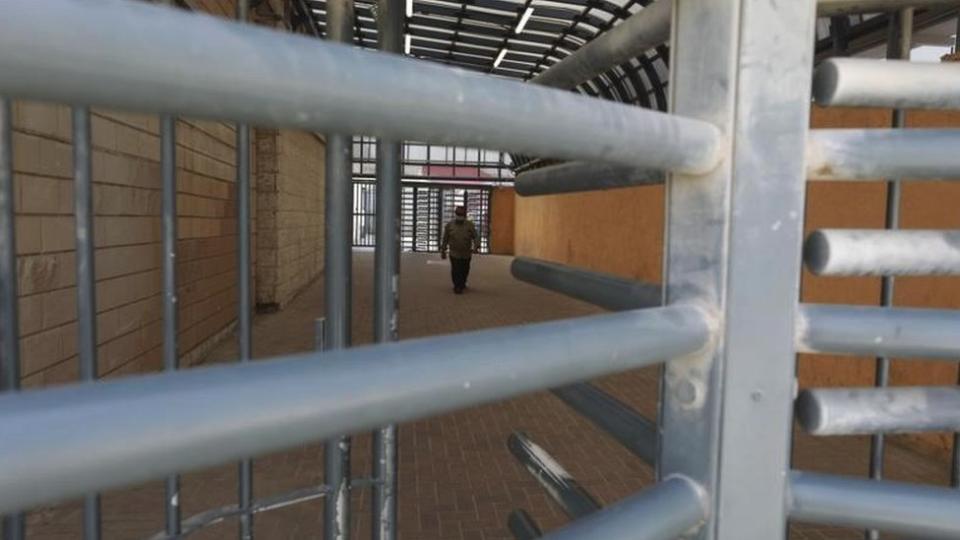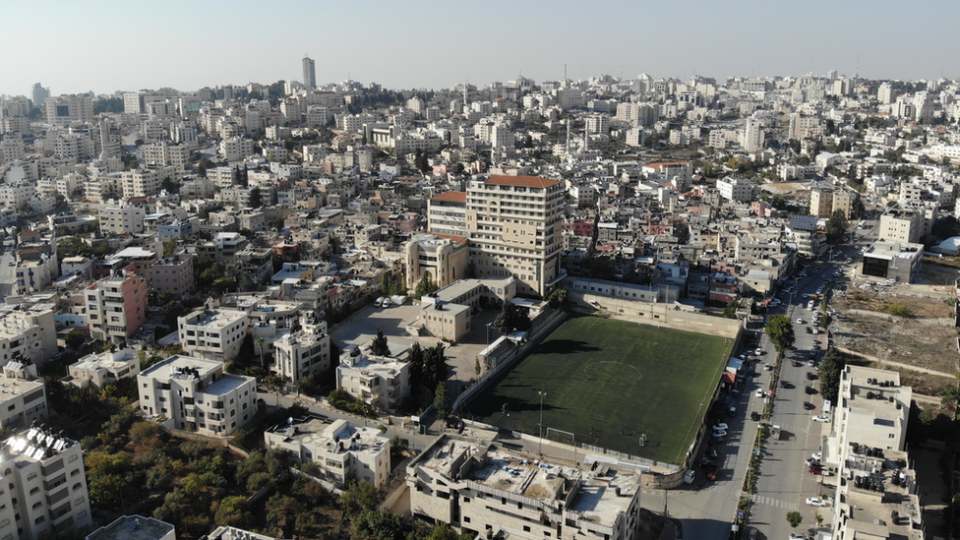Kamal Karaja used to earn $3,500 (£2,780; €3,250) a month working on construction sites in Israel – a good living for a Palestinian in the occupied West Bank.
But after the Hamas assault on Israel on 7 October, and the retaliatory Israeli air strikes and ground invasion of the Gaza Strip, his permit was cancelled. Israel cited “security concerns”.
“I waited for the war to end but it’s still ongoing,” says the 32-year-old, from the town of Deir Bzi, just outside Ramallah.
“I had to sell my car after a month due to money problems.”
The Palestinian Authority (PA) says 200,000 workers are affected, mostly in the West Bank.
Kamal says his three-year-old daughter Zeina “notices that I’m not buying as much food and vegetables for the house as before”.
“She asks me why I no longer buy her chocolate and crisps.”
Hundreds of men in Kamal’s town are sitting at home for the same reason – and the economy has ground to a halt.
After months of job-seeking, Kamal got two weeks’ work on a construction site in the West Bank.
But his employer had to lay him off due to the worsening financial situation.
He has now started cutting down trees and selling firewood to local residents.
“Selling firewood is worth 2% of the salary I used to get from working in Israel,” says Kamal.

He did not receive any compensation from the authorities or his employer when his permit was cancelled.
Like many other Palestinian workers, he was employed without a contract.
Foreign worker campaign
Palestinians working in Israel – and those working in Israeli settlements in the West Bank – accounted for nearly one in five of all Palestinian workers before 7 October, according to official Palestinian figures.
Israeli settlements in the occupied West Bank are considered illegal under international law, though Israel disputes this.
The workers contributed $3.2bn annually to the Palestinian economy, with most employed in construction.
While some Israeli business groups lobbied for Palestinian workers to be allowed back, the government has come up with a different plan.
It wants to replace Palestinian workers and plans to admit more than 60,000 workers from India, China, Moldova, Sri Lanka and Thailand this year.
The head of the Palestinian General Federation of Trade Unions, Shaher Saad, has criticised Israel’s decision.
“There were about 105,000 Palestinians working in construction in Israel,” Mr Saad told BBC Arabic, adding that they were all unemployed now.
“The agreements between Palestinian and Israeli unions force employers to pay compensation to workers due to the cessation of work.
“But the Israeli employers evade paying their dues and there is no law in Israel that forces them to do so.”
Mr Saad added that it would be “unrealistic and difficult” to replace the expertise of Palestinian workers in the construction, agriculture, tourism and service sectors.
Electricity and water cuts
Bassam Karaja (no relation), a Palestinian father-of-four from Ramallah, has also found himself forced into poverty after his work permit was cancelled.
He can no longer afford to pay his bills, so his electricity and water have been cut off.
“I was never late in paying the electricity and water company while I was working in Israel these past 10 years,” says Bassam.
“But when I stopped working, they stopped their service.”


Bassam used to earn $4,000 per month while working in Israel.
He says the past four months have been the worst since the Covid pandemic, where he was at least able to work part-time.
Bassam accuses the Palestinian Authority, led by President Mahmoud Abbas, of neglecting workers, and says they could have provided financial aid or at least stopped the utility firms withdrawing their services.
Since the start of the war, the unemployment rate in the Palestinian territories has jumped from 23% to 47%.
The Palestinian economy has also contracted by 35%, according to Labour Minister Nasri Abu Jeish.
Mr Jeish said the PA had asked donor countries and the International Labour Organisation for help but “they haven’t heard back yet”.
The Palestinian Authority was already suffering financially before the war, but now it is even worse.
Israel collects tax revenues on behalf of the PA, worth about $188m per month.
This money is used by the PA to pay civil servant salaries and fund public services in both Gaza and the West Bank.
As a sign of the growing crisis, the PA only paid staff their December salary a few days ago, at a reduced rate of 60%.
It’s estimated that the PA spends about 30% of its budget in Gaza, even though Hamas has run the territory since 2007.
Israel said in November that it would not allow any money to go to Hamas in Gaza, stripping this funding out.
The PA refused to receive the reduced tax revenues from Israel, forcing it to cut salaries.
There seems to be no end in sight.
“We thank God that we are still able to provide food and water to our families,” says Kamal.
“The butcher understands my situation because he’s a relative – but I can only last another month.”

David Turner is a globe-trotting journalist who brings a global perspective to our readers. With a commitment to shedding light on international events, he explores complex geopolitical issues, offering a nuanced view of the world’s most pressing challenges.








